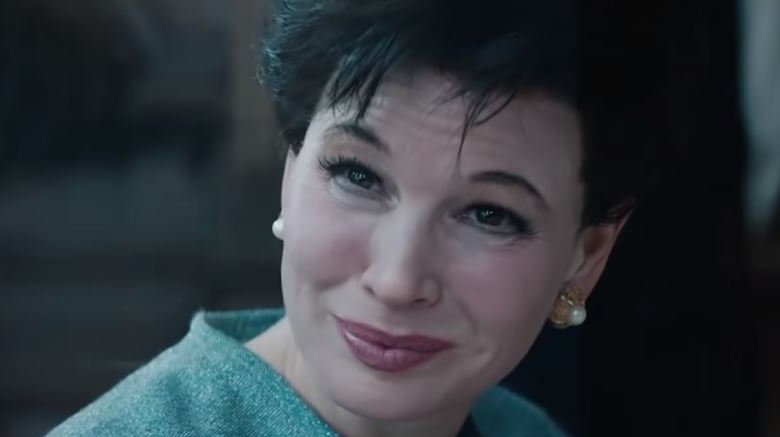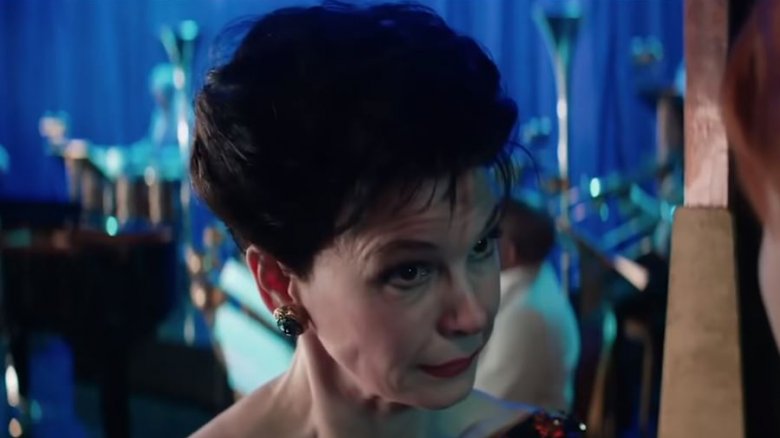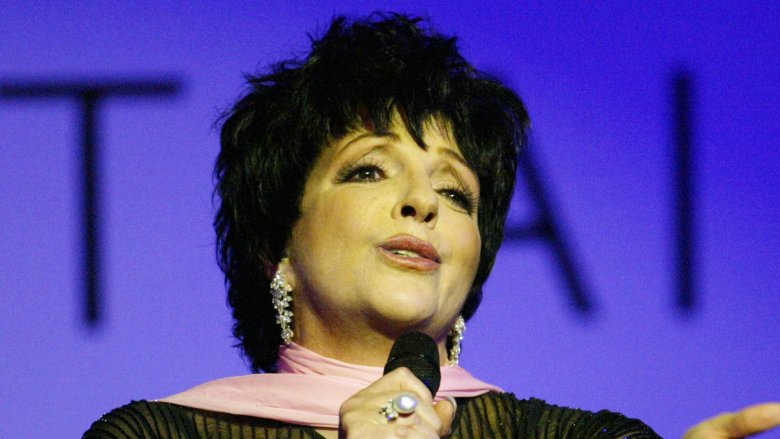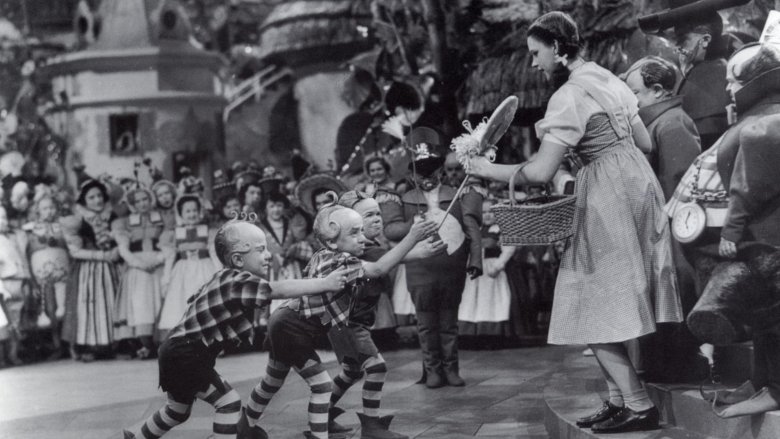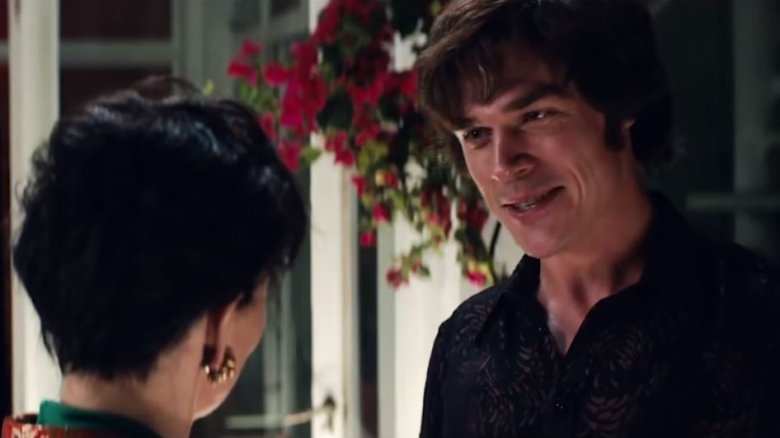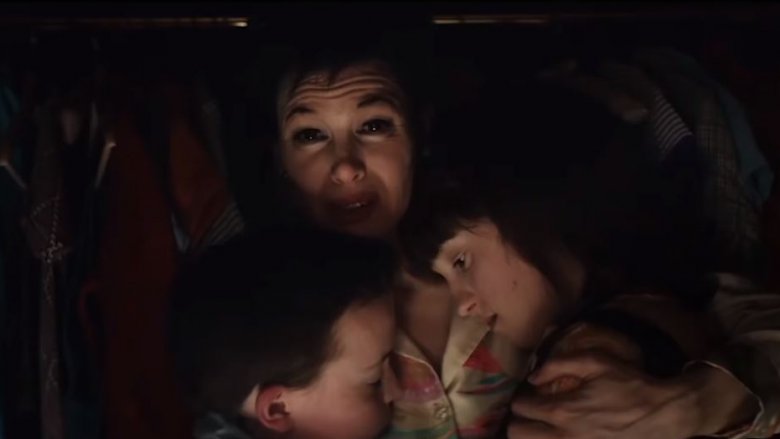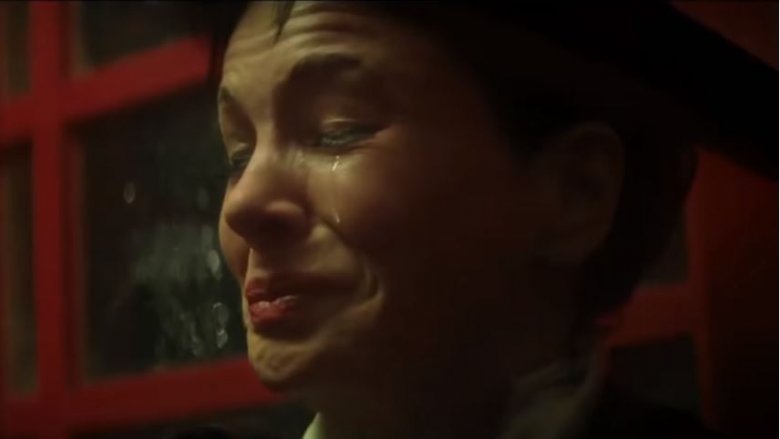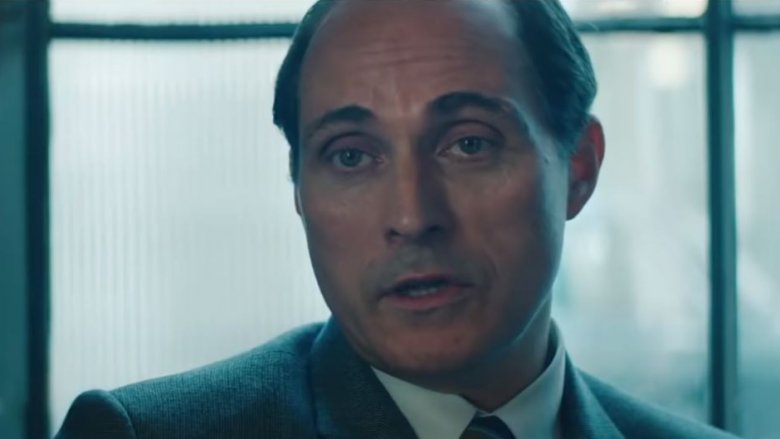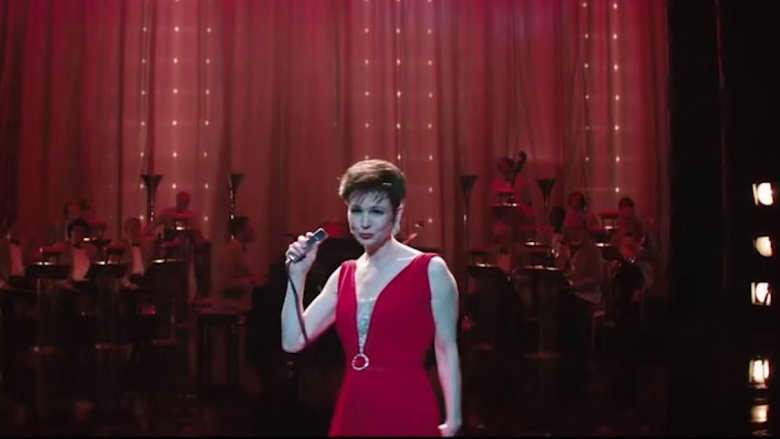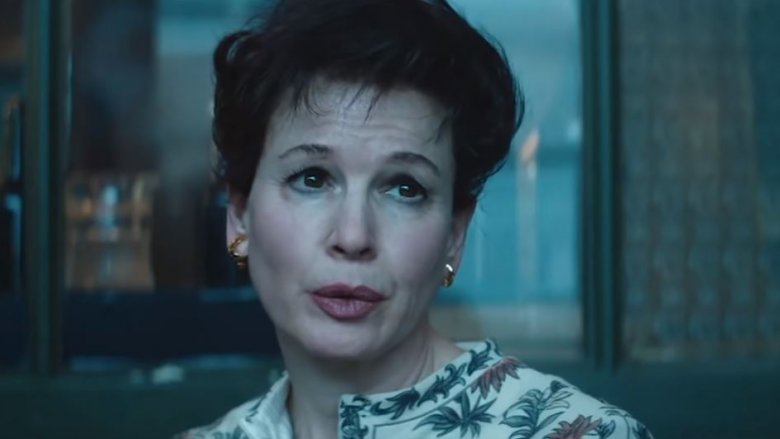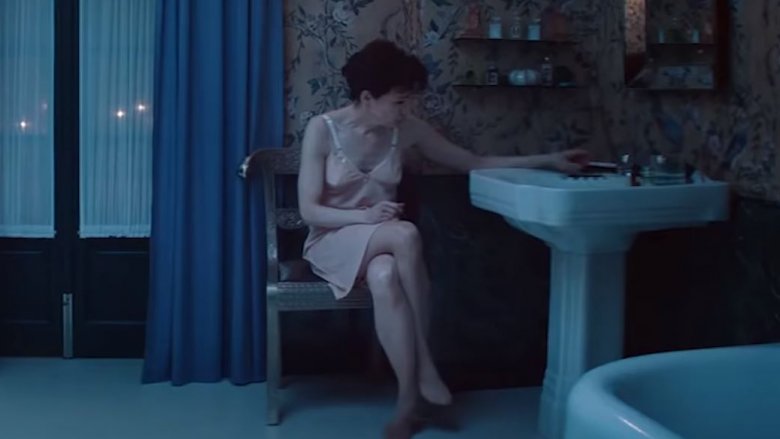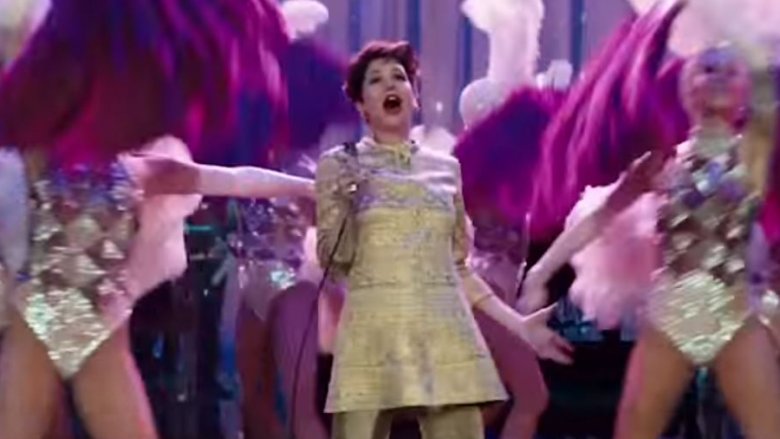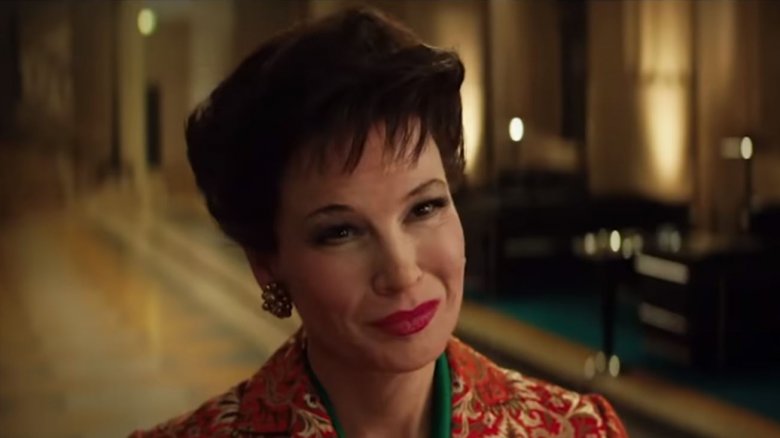The Untold Truth Of Judy
To an outside observer, Judy Garland was the epitome of Hollywood glamour. From her early days as a child star to the critically acclaimed performances of her later career, she spent her life in the spotlight singing, dancing, and acting her way into the hearts of the world. To put her talent in true perspective, the American Film Institute ranks her among the greatest "American screen legends" in history. However, despite her vast popularity and success, her private life was filled with turmoil. From early childhood to her untimely death aged just 47, Garland appears to have existed in a state of near-constant chaos, and could never quite handle the massive pressure from the outside that is the unfortunate byproduct of early celebrity.
It's a little strange that it has taken so long for Garland to get her own biopic, but that glaring omission is about to be remedied soon, when Renée Zellweger throws herself into the role of the entertainment icon in Judy, which Vanity Fair tells us depicts Garland's tumultuous life in 1968, the year before her untimely death. Movies like Bohemian Rhapsody, The Dirt, and Rocketman have turned the musical biopic genre into a pretty hot (and hotly contested) commodity, but by the looks of it, this particular one might just bring something entirely new to the game. Let's take a look at the untold truth of Judy.
Renee Zellweger's massive preparations for Judy
Playing one of Hollywood's most recognizable all-time greats is no easy feat. Renée Zellweger appears to be well aware of this, as People tells us her preparations for the role of Judy Garland were extremely meticulous. She "read everything she could" about Garland, which gave her a great respect of the screen legend. To achieve Garland's very recognizable look, Zellweger was also completely transformed with assorted prosthetics, wigs, contacts, and makeup in a process that took two hours every day. The end result seems convincing, to say the least. When you look at the finished makeup, it's not too hard to suppress your disbelief and imagine it's the real Judy Garland. It doesn't exactly hurt that judging by the trailer, she seems to have captured quite a lot of Garland's famous mannerisms and postures.
And then, of course, there's the singing. We've known that Zellweger can carry a tune since her role in Chicago, and as Classic FM reports, she sings all the legendary Garland songs we hear in Judy herself. Perhaps wisely, though, director Rupert Goold advised her against trying to imitate Garland's iconic voice, and to just "make the songs her own" instead.
Liza Minnelli disapproves of Judy
When someone makes a movie of your famous mother and you happen to be rather well known yourself, it's only natural that someone is going to ask you about said movie. Such is the case with Judy Garland's oldest daughter, Liza Minnelli, but unfortunately for the makers of Judy, her reaction wasn't exactly two thumbs up.
In a 2019 interview with Entertainment Tonight, Minnelli said that she hasn't seen any trailers and seemed quite ambivalent about the project, saying that she thinks Renée Zellweger is a "wonderful" actress but also noting that she hopes "they don't do what they always do." However, Vanity Fair notes that Minnelli's earlier comments about Judy have been a lot less reserved. In fact, she has stated that despite rumors to the contrary, she has never met with Zellweger or aided her in preparation for the role in any way, and even stated that she neither "approves nor sanctions" the film. Which must be pretty weird for her, because she actually is in the film, as a character that is, played by Gemma-Leah Devereux.
Judy Garland, MGM, and the Wizard of Oz shoot
As Judy's trailer shows us, the movie will visit Judy Garland's days as an MGM contract actor, and it even shows the set of her arguably most famous film, The Wizard of Oz. These are unlikely to be particularly happy scenes. As Biography writes, the 13-year-old Garland signed a contract with Metro-Goldwyn-Mayer in 1935, but the studio didn't exactly treat her well. MGM controlled Garland's weight with ruthless diet programs that included amphetamine-based prescription pills, and when she started to become popular, they happily piled more and more work on the starved and exhausted young actress, with little to no regard about her health.
The production of 1939's The Wizard of Oz, was a particularly nasty time for Garland. According to Deseret News, the disastrous project was marred by numerous setbacks, injuries and behind-the-scenes meddling, and poor, 17-year-old Garland was in the middle of it all. As the Irish Independent tells us, she wasn't MGM's first choice for the role (Shirley Temple and Deanna Durbin were both unavailable). The assorted directors had radically differing visions for her look, costume and approach to the role, the studio gave her its usual hell. Express reports that as a final insult to injury, Garland's closest cast members were jealous of her, and unlike Dorothy, she failed to get any support from Scarecrow, the Cowardly Lion, Tin Man, and the Wizard. Ironically, though, she was on great terms with the Wicked Witch of the West.
Judy Garland and Mickey Deans
According to Vanity Fair, the bulk of Judy takes place in 1968, when Garland performed some of her last concerts while trying to deal with a host of personal and professional problems. However the trailer seems to tell us there was at least something positive in her life at the time: Her fifth husband Mickey Deans, who People tells us had met her three years earlier in 1966 when he delivered her some pills. Though one might think this is not the optimal start of a relationship, we'll never find out how the two might have made it work, because they had been married all of three months when Deans found the lifeless Garland in their bathroom on June 22, 1969. According to the Guardian, she died of an accidental overdose of barbiturates at only 47-year-old.
It's interesting to see how the movie plays the relationship between Garland and Deans. Though the trailer makes it appear that the two were quite happy, Deans' pill-delivering background and role as the young, handsome buck in Garland's life makes him a potential candidate for a sneaky villain role, not unlike John Reid in Rocketman. The fact that Deans is played by Finn Wittrock, who is known for his multiple villainous turns in American Horror Story, seems to support this theory.
Judging by its cast, Judy will be the darkest movie ever
While Judy's trailer makes it clear that the movie will have many moments of levity, its general tone is somewhat dark. In fact, when you look at the cast, it sure seems that as biopics go, the filmmakers are going for less The Dirt and more The Darkest Hour. Renée Zellweger's Judy Garland is surrounded by actors who are experts at portraying desperation, dark brooding, and even outright evil. Apart from the aforementioned American Horror Story villain Finn Wittrock, who plays Garland's eventual fifth husband and therefore the apparent love interest, another villain expert Rufus Sewell (The Man in High Castle, A Knight's Tale, The Illusionist, etc.) plays Garland's third husband Sid Luft.
Manning the husband roles with notorious bad guy actors is probably not entirely accidental, but the trend of dark casting doesn't stop there. We have notorious brooder Michael Gambon in the role of impresario Bernard Delfont, and RTE tells us Jessie Buckley (Lyudmilla Ignatenko in HBO's Chernobyl) plays the role of production assistant Rosalyn Wilder. Even the child roles in the movie aren't safe from brooding, as Garland's daughter Lorna Luft is played by Bella Ramsey, whose most famous role is Lady Lyanna, the grumpy underage head of House Mormont from Game of Thrones.
Oscar bait for Renée Zellweger?
People who still somehow only remember Renée Zellweger from her goofy role as Bridget Jones may forget that her acting abilities can hold their own against most anyone, and her awards cabinet can back that statement up. She has an Academy Award (Best Actress in a Supporting Role, Cold Mountain, 2003) and two Best Actress nominations, one of which was actually for ... her goofy role as Bridget Jones. She also has three Golden Globes, a BAFTA Award, and a whole bunch of lesser awards. However, she swept most of those awards way back in 2004, and as Vanity Fair tells us, she felt that she eventually worked herself to the ground, which led to a six-year hiatus from the film business. Her comeback movie was 2016's Bridget Jones' Baby, which got mixed reviews, and she has only made two movies and the Netflix show What/If since then.
Judy, however, gives the actor arguably the juiciest role of her entire career, and judging by her immaculate preparations, she is gearing up to give it all. As such, Judy Garland could be to Zellweger what Freddie Mercury was to Rami Malek, to the point that Slash Film states Zellweger's campaign for a second Oscar has already begun and the awards season should bring some pretty good things to her.
Judy and Sid Luft
As People attests, Judy Garland went through no less than five marriages, and the one that lasted the longest was also the one that seems to get ample screen time in Judy, as both Sid Luft and the couple's two children make an appearance in the trailer.
Garland got together with Sid Luft, who is played by Rufus Sewell in the movie, after she had been dropped by MGM and was recovering from a suicide attempt. Though the New Yorker points out that their union was as much professional as it was romantic, Luft says he felt extremely protective of Garland, and their marriage did last for 13 years. Luft was a driving force behind her surprisingly effective comeback, which consisted of successful live performances in New York and London, as well as an Oscar-nominated role in the 1954 remake of the 1937 movie A Star Is Born (yep, the one Bradley Cooper later remade). Unfortunately, Garland's drug addictions and other issues eventually took over the relationship, and by 1962, their marriage was beyond salvaging. However, it's possible that Garland wasn't the only one contributing to the collapse — in their 1965 divorce hearing, she told the judge that Luft had been abusive on numerous occasions.
If you or anyone you know is having suicidal thoughts, please call the National Suicide Prevention Lifeline at 1-800-273-TALK (8255).
Judy is based on a musical
As Playbill tells us, Judy is based on a play called End of the Rainbow, which the Hollywood Reporter says has had runs on both Broadway and London's West End. Much like the movie, the play is set in late 1968, and explores a disheveled Judy Garland as she wrestles with personal, professional, and monetary concerns during a series of shows at a London establishment called Talk of the Town.
Oddly enough, while Renée Zellweger has expressed hope that the movie portrays Garland in a sympathetic light, Hollywood Reporter notes that the play essentially fails to do so. Instead, it opts to portray Garland as an entertainer that "was 'on' all the time" regardless of whether she was actually performing, which doesn't really help the audiences to connect with her. Interestingly, the play also seems to treat the character of Garland's fifth-husband-to-be Mickey Deans as "a one-dimensional opportunist" who is first out to charm Garland, and then becomes a villainous "enabler" of her self-destruction. It will be interesting to see how much of these character traits remain in Judy, because they seem uncomfortably close to the dynamics between Freddie Mercury and Paul Prenter in Bohemian Rhapsody, as well as Elton John and John Reid in Rocketman.
Judy Garland's problematic family
Darci Shaw plays young Judy Garland in Judy, and the trailer shows flashback scenes with Natasha Powell playing Garland's mother Ethel Gumm, so there's a fair chance that the movie will explore Garland's less than ideal childhood. There's certainly plenty of juicy material in that part of her story. Biography tells us her early years were full of acting and dancing lessons, along with performances as a Jackson Five-style sibling group called the Gumm Sisters (Garland's original name is Frances Gumm). Biography also notes that Garland wasn't exactly happy about the way her mother pushed her toward stardom. Gumm forced young Garland to perform at nightclubs and other venues that were incredibly inappropriate for a young child, and if she couldn't live up to the standards, well, let's just say Garland has been known to call her mother "The real Wicked Witch of the West."
In 1967, the actress had this to say about her mother: "She would sort of stand in the wings when I was a little girl and if I didn't feel good, if I was sick to my tummy, she'd say, 'You get out and sing or I'll wrap you around the bedpost and break you off short!' So I'd go out and sing." Even the Wicked Witch of the West didn't do that.
Judy Garland and drugs
Drugs were a part of Judy Garland's life from an early age, and Judy's trailer makes it clear the movie doesn't intend to shy away from the fact, as Renée Zellweger's Garland can be seen popping pills even in the presence of her own children. As History tells us, Garland's own mother started feeding her so-called "pep pills" to keep her performances reliably perky at a young age, and MGM-affiliated doctors continued the practice in order to control her weight and energy.
Here's how Garland reportedly described the daily routine of herself and fellow child star Mickey Rooney: "They'd take us to the studio hospital and knock us out with sleeping pills... then after four hours they'd wake us up and give us the pep pills again so we could work 72 hours in a row. Half of the time we were hanging from the ceiling but it was a way of life for us." This steady diet of drugs, combined with the constant stress Garland's hard-working, high-profile life caused her, led to lifelong struggles with addiction and, ultimately, her untimely death by accidental overdose in 1969 — the year after the movie's events.
Judy the gay icon
Though Robert Leleux of the New York Times notes that Judy Garland's notoriety among the younger members of the LGBTQ community might be slightly on the wane, there's no contesting the fact that the screen legend is a bona fide gay icon. Garland's opulent performances and image lent themselves well to a significant following among the gay crowd. It remains to be seen how Judy will address this, but if it tries to skirt around the fact it faces an uphill climb. After all, the movie tells the tale of Garland's final years, and some believe her death was actually the event that jump-started the Stonewall riots of 1969 — and, by extension, the birth of the international gay rights movement.
Incidentally, Garland's gay icon status was particularly apt when you consider David Shipman's Judy Garland: The Secret Life of an American Legend, which attests that the actress herself was very much a member of the LGBTQ community due to her bisexuality. The book says that her impressive list of affairs included at least one "unnamed woman" who worked at the MGM studios — though it's unlikely that this will be addressed in the movie, seeing as it takes place after Garland's tenure with MGM.
Renée Zellweger hopes the movie presents Judy Garland in a new light
Judy is, of course, a biopic, but Renée Zellweger believes that it will do more than offer a superficial peek in the life and times of Judy Garland. According to Vanity Fair, Zellweger hopes the movie can help us to understand just how difficult Garland's life was and what she had to suffer through in order to succeed, as Zellweger puts it, "In a time when women didn't necessarily feel that they had power over their own lives."
Zellweger herself was quite touched by how powerless the studio, managers, and other authority figures often made Garland despite her global stardom, and hopes that the audiences will be as well. She thinks that the movie, which takes place during what was among the most stressful periods of the late entertainment legend's life, may show the audiences a new side of her. "When there's a better understanding of what it takes for a person to continue under certain circumstances, there is a level of empathy and respect that you can't help but feel."
